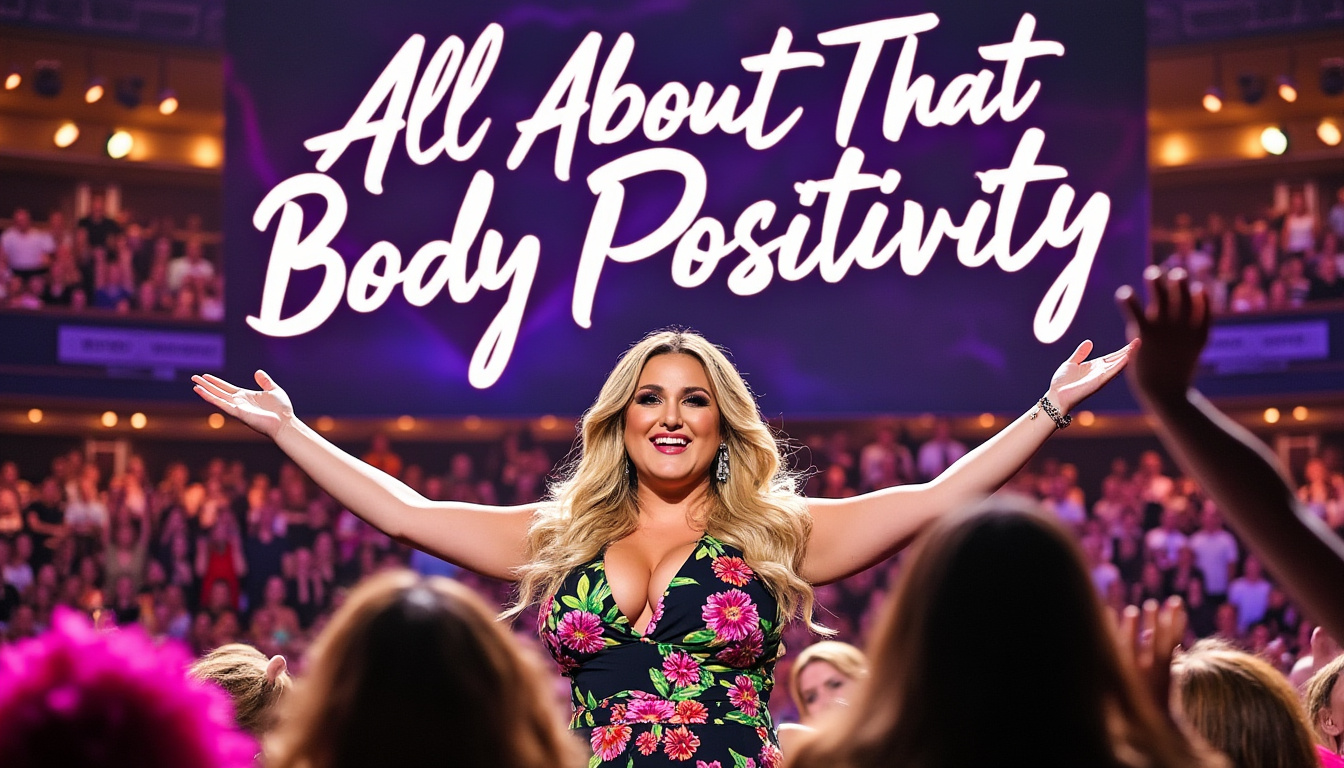Over the years, music has profoundly evolved, transitioning from traditional forms to become a vital component of pop culture. One standout piece that epitomizes this shift is Meghan Trainor’s “All About That Bass,” which debuted in 2014. Since its release, it has sparked conversations around themes of body positivity and acceptance. However, as the artist continues to grow personally and professionally, an evolution in her lyrics has emerged, reflecting her journey and the transformations in her life. The recent changes made to this iconic track have not only surprised fans but also reignited discussions about the song’s core message and highlights the fluid nature of art.
The Original Message of “All About That Bass”
When “All About That Bass” first hit the airwaves, it quickly became a cultural phenomenon. The song’s catchy melody paired with its upbeat lyrics provided an anthem for those who felt marginalized by societal beauty standards. At its heart, the track embodies a message of body positivity, encouraging listeners to embrace their bodies and reject the idea that only slim figures are worthy of love and acceptance. Lines like, “Yeah, it’s pretty clear, I ain’t no size two,” resonated widely, especially among women who often struggle with body image issues.
The impact of this song is undeniable, and its chart performance underscores that. Achieving number one positions in multiple countries, it proved to be more than just a summer hit; it marked the beginning of a movement. For many fans, especially young women, “All About That Bass” became a source of empowerment, empowering listeners to celebrate their curves and own their identities.
- Empowerment through Lyrics: The song’s lyrics challenge the conventional beauty standards propagated by the media.
- Cultural Impact: It fueled conversations about body image and the representation of women in music.
- Meghan Trainor’s Authenticity: Her personal connection to the message amplified its reach.
With its addictive beat and relatable lyrics, “All About That Bass” cultivated a legacy that would define Meghan Trainor’s career. However, as Trainor evolved as a person, her relationship with the song began to shift, raising questions about authenticity and the ever-changing nature of artistic expression.

The Evolution of Trainor’s Own Body Image
In 2025, Trainor made headlines once again when she updated the lyrics during her performance at iHeartRadio’s KIIS-FM Wango Tango event in California. This change drew mixed reactions from fans, as Trainor now sang, “Yeah, it’s pretty clear, I got some new boobs,” instead of the original line referencing her size. Interestingly, this lyric adjustment came shortly after she underwent a breast augmentation and significant weight loss, prompting discussions about the artist’s journey towards self-acceptance.
Many fans recognized that changes in Trainor’s appearance could influence her lyrics. However, the alteration sparked a debate about whether changing the message contradicts the song’s narrative about body confidence. Critics and supporters alike voiced divergent opinions on social platforms. One prevalent sentiment among detractors was encapsulated in a comment suggesting that Trainor “shouldn’t be allowed to sing this song anymore” due to her altered image. Conversely, others defended her, emphasizing that everyone has the right to embrace transformation.
| Fan Reactions | Sentiment |
|---|---|
| “She shouldn’t be allowed to sing this song anymore.” | Negative |
| “A woman’s body changes; this shouldn’t diminish her message.” | Positive |
| “Body positivity is about owning your choices.” | Supportive |
The dialogue surrounding these lyrical changes reflects broader societal conversations around body image. In today’s digital age, where social media amplifies every moment, public figures are held to high standards of authenticity. The music evolution surrounding this track illustrates how music continuously adapts to reflect the artist’s life stages, struggles, and achievements.
Analyzing the Lyrics Changes: Context and Impact
Examining the specifics of the lyric changes in “All About That Bass” reveals layers of meaning that extend beyond just the music itself. At its core, the original song was an affirmation of self-love, celebrating one’s imperfections and embracing individuality. By modifying lyrics to reference a personal physical change, Trainor shifts the narrative from collective empowerment to one that is more individual and reflective of her journey.
With rising pressures on artists to maintain authenticity, it’s crucial to evaluate the implications of these adaptations. The outcry from fans suggests the fine line artists must tread between personal representation and public expectation. As society evolves, so too do discussions around body positivity, beauty ideals, and women’s choices. In many ways, this shift in Trainor’s lyrics embodies a desire to prioritize honesty in a space that often celebrates facade over authenticity.
- Layers of Meaning: The changes reflect an ongoing battle with societal pressures.
- Shifting Narratives: The personal nature of the change aligns with modern discussions around identity.
- Art versus Life: The intersection of personal growth and artistic integrity generates engaging discourse.
The complexity of this situation also elicits questions about whether an artist should feel obligated to uphold the original message of a song. Are songs static pieces of art, or do they evolve as the artist’s life changes? As music itself is often a reflection of personal experiences, such discussions enrich the realm of songwriting and allow listeners to connect deeply with the artist’s story.

Public Reactions: A Mixed Bag
The public’s reaction to Trainor’s recent lyrical updates has been notably mixed. For every voice of dissent, a counterpoint emerges defending her choice, celebrating the singer’s newfound confidence following her body surgery. This divide showcases the complexity of the dialogue surrounding body image in a contemporary context. Advocates for body positivity often stress that transformation should not negate one’s message. They argue that being open about one’s choices promotes authenticity.
Nonetheless, it remains essential to recognize sentiments of disappointment among fans who feel the original song tied them to a broader community. This paradox reflects a significant aspect of pop music—it serves as both a personal and communal experience. The tension between personal expression and collective identity can create distinguishing challenges for artists like Trainor.
| Public Sentiment | Response |
|---|---|
| Disappointment about message integrity. | Calls for retaining original lyrics. |
| Support for transformation. | Celebration of personal growth. |
| Calls for a nuanced discussion. | Highlighting individuality in pop music. |
Trainor’s evolution as an artist continues to challenge listeners and provoke thought, pushing the boundaries of how we view music and identity. The intricacies of her journey reveal deeper commentary about societal pressures exerted on women, particularly in the entertainment industry. The ongoing discourse illuminates layers of societal norms, expectations, and the complexities of individual choice.
Revising Body Positivity: Current Perspectives
The debates stemming from Meghan Trainor’s lyric changes unleash discussions about the current landscape of body positivity and what it means in a society increasingly focused on self-improvement and personal choice. With contemporary media glorifying specific body types while simultaneously claiming to promote acceptance, it raises the question: how does one balance personal fulfillment with societal expectations?
Trainor’s updates to “All About That Bass” underscore a complex relationship with the concept of empowerment. On the one hand, her decisions reflect an acknowledgment of personal agency in shaping one’s body. On the other hand, it brings forth concerns that such changes might conflict with the very message of empowerment her original song embodied. By examining Trainor’s choices, fans and critics alike can engage in enriching dialogues about what empowerment should truly look like.
- Conversations around Empowerment: The change in lyrics has prompted discourse on how society defines empowerment.
- Media Influence: The push for specific body standards creates complicated narratives.
- Personal Agency: Choices made about one’s own body should be honored while also understanding their social implications.
Moving forward, it’s essential to navigate these conversations with nuance. The evolution of popular music often reflects shifting attitudes toward body image, representation, and empowerment. As fans continue to embrace or challenge Trainor’s lyrical changes, they simultaneously engage in a broader discussion about self-acceptance, personal choice, and the power of storytelling through music.
Conclusion: The Soundtrack of Change
Through the examination of her evolving song, Meghan Trainor’s journey resonates as a reflection of the changing dynamics of pop culture and personal identity. Each lyric carries weight, influencing listeners and provoking conversations about what it truly means to accept oneself amidst societal pressures. The complexities surrounding “All About That Bass” showcase the rich and intricate relationship between artists, their work, and the meanings that listeners ascribe to them.
As the dialogue continues to unfold, it is evident that music serves not only as entertainment but also as a vessel for personal narratives. Meghan Trainor’s journey highlights the ongoing fight for representation and acceptance in a world that is constantly evolving. By embracing personal changes while navigating societal expectations, the artist exemplifies the dynamic nature of both the individual and art itself.



